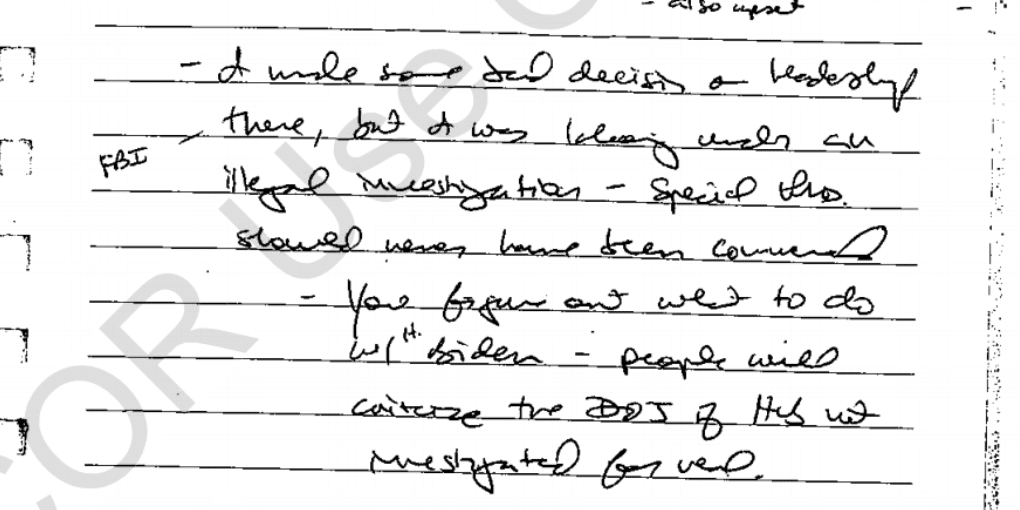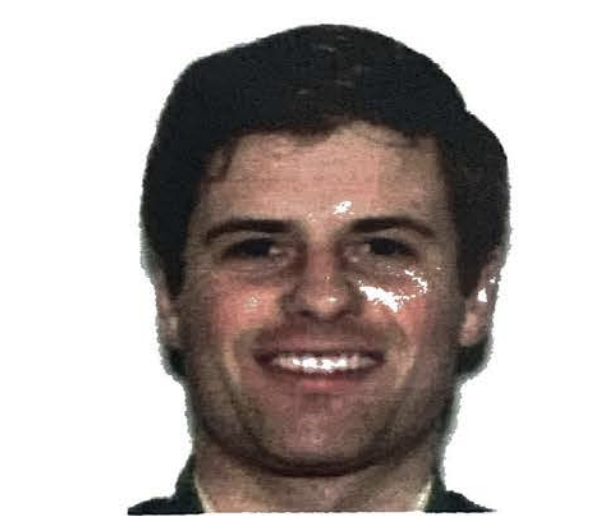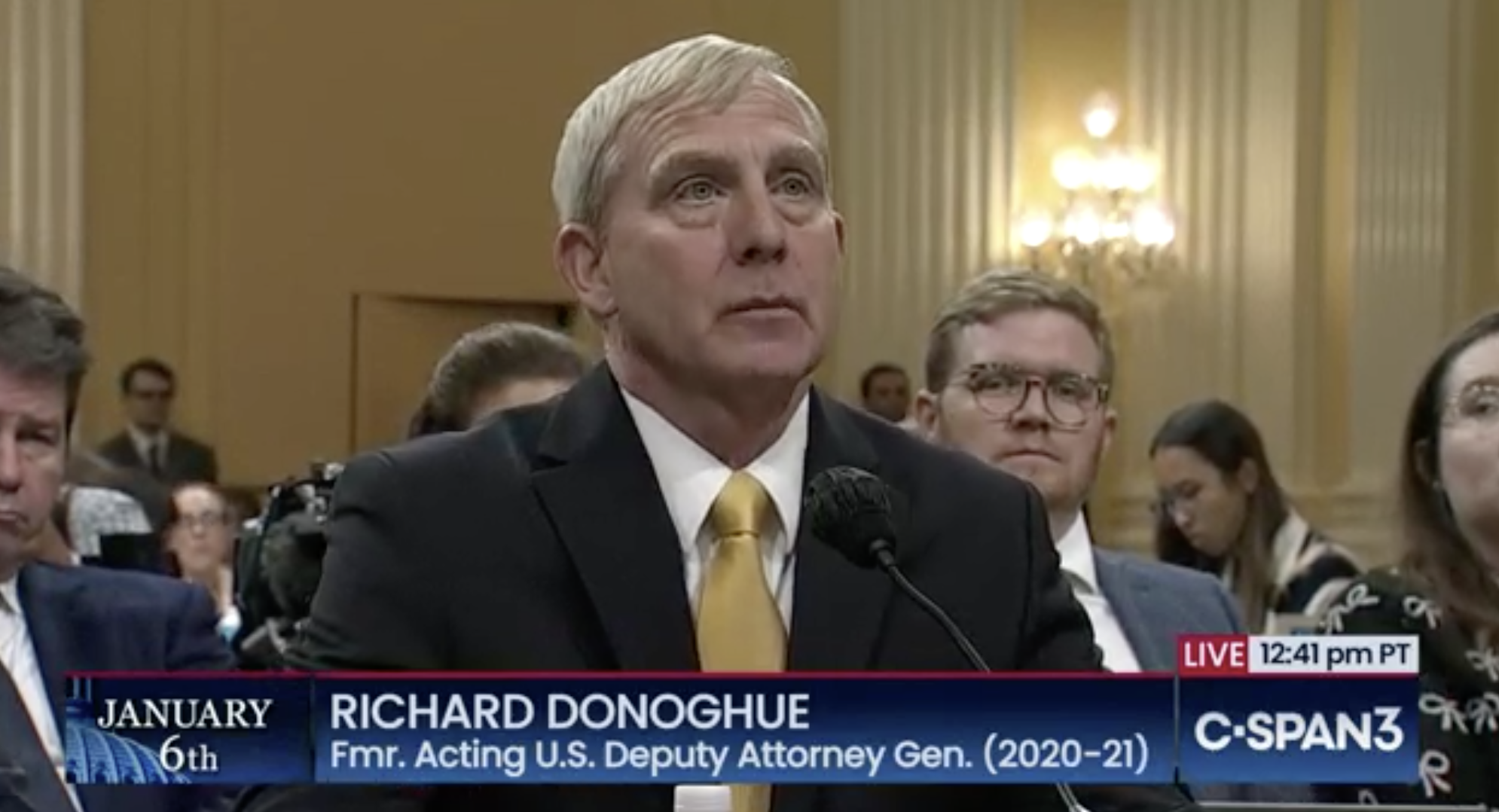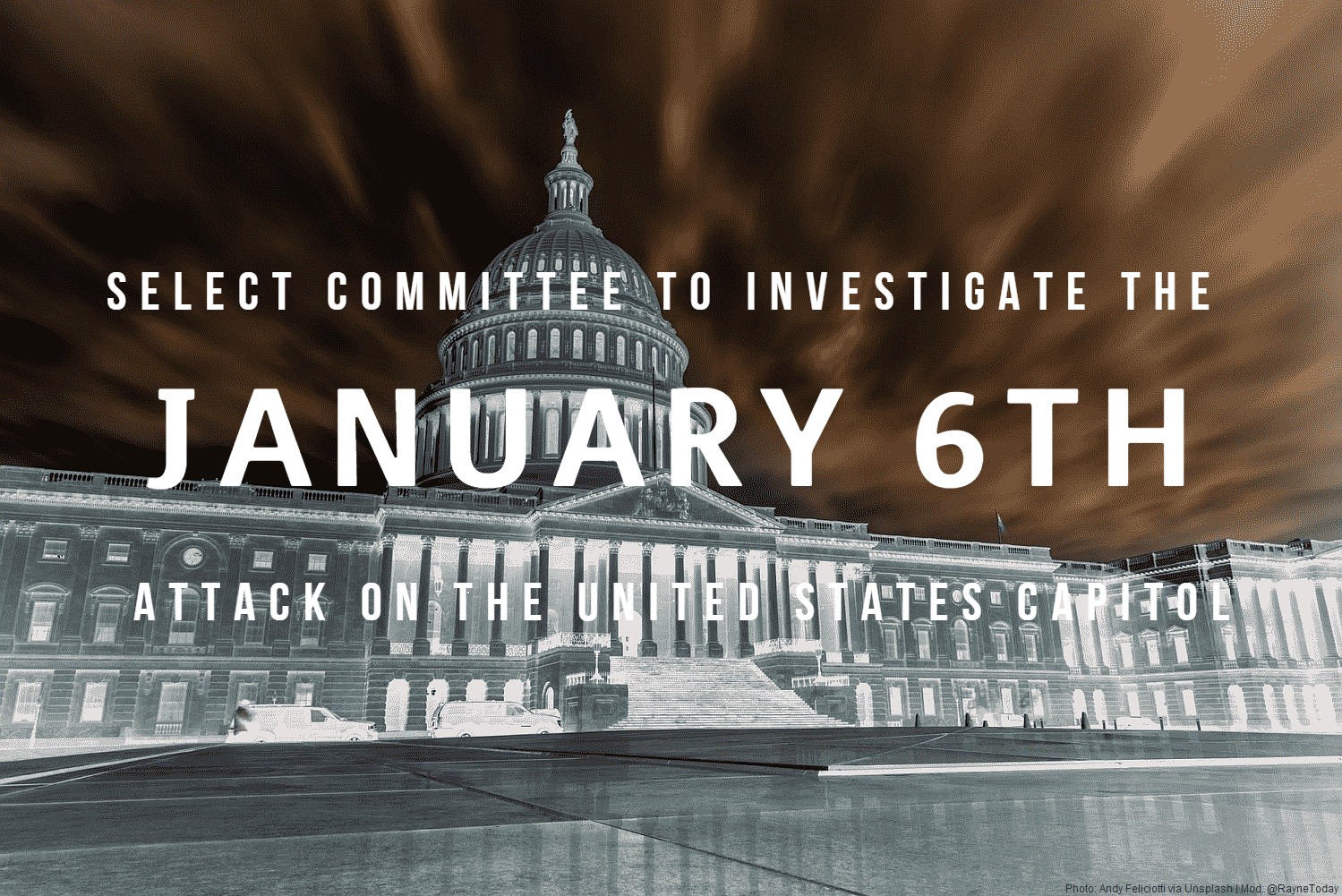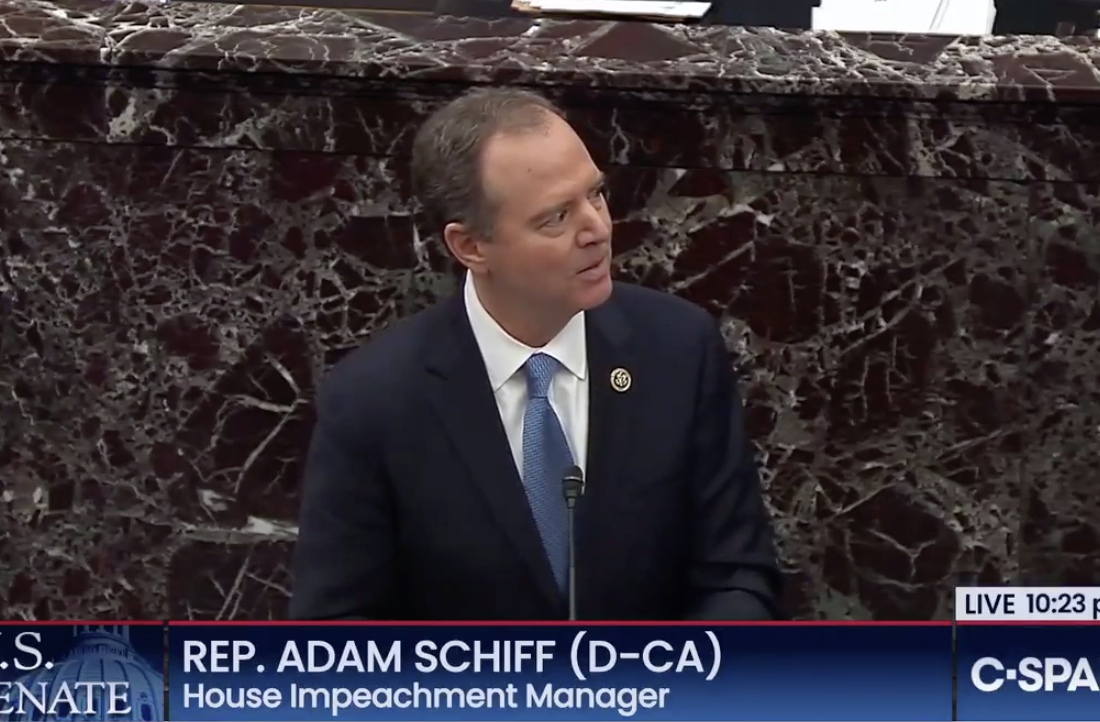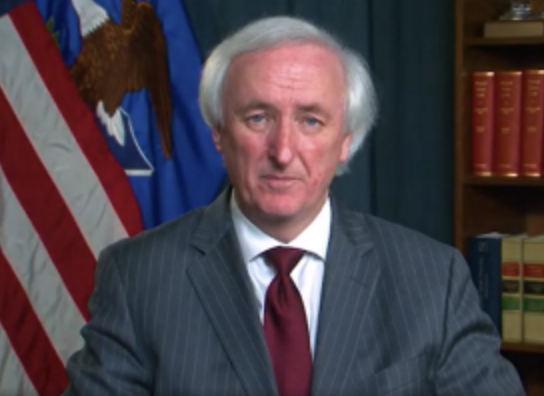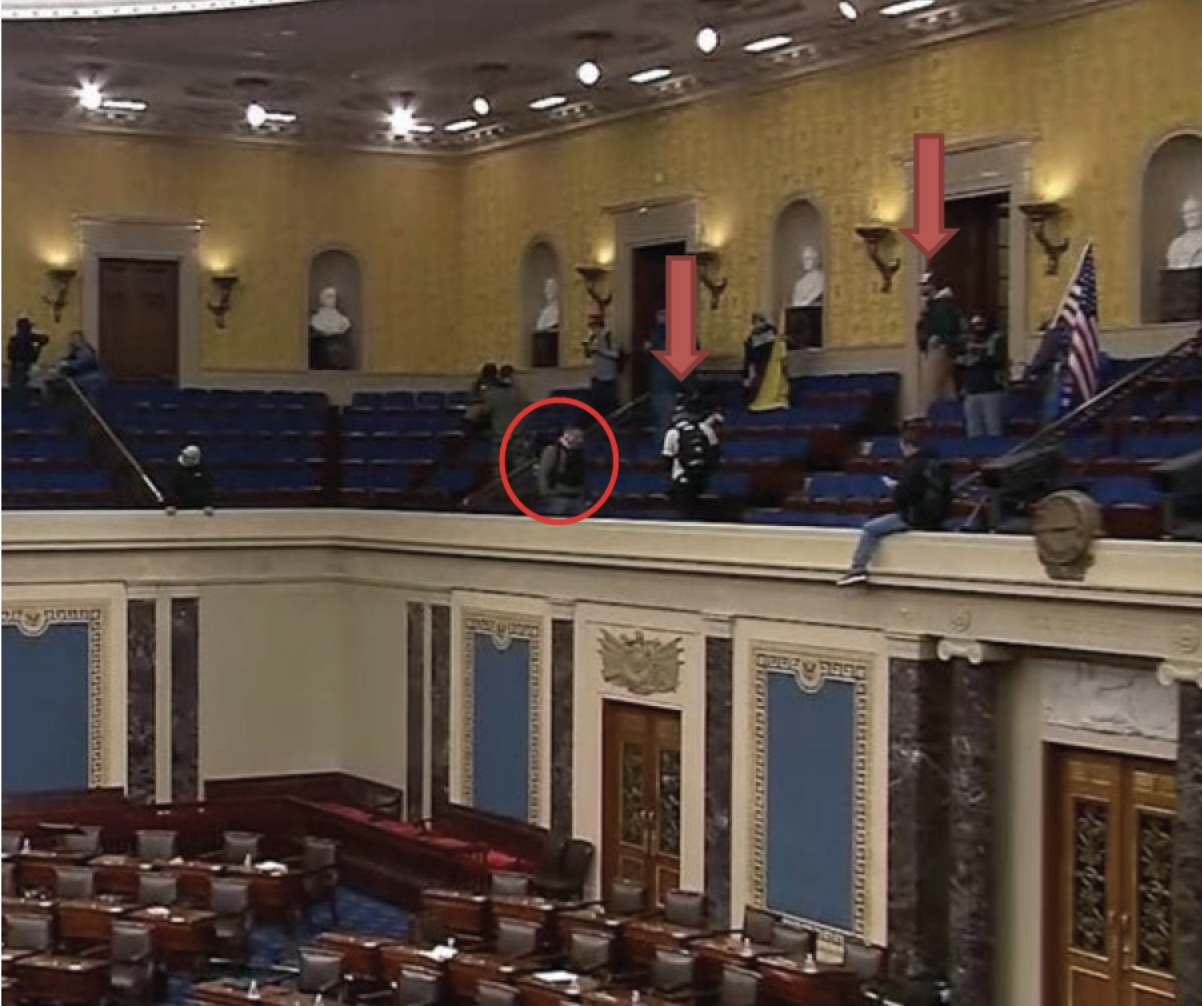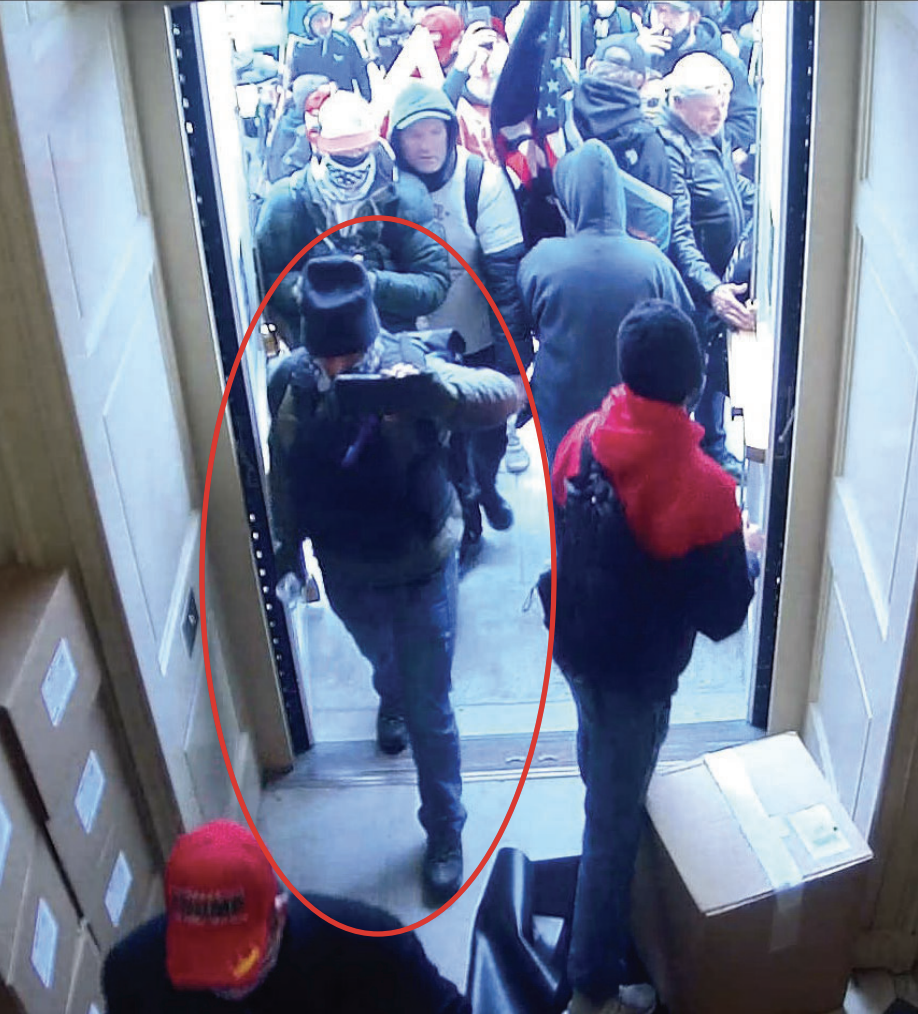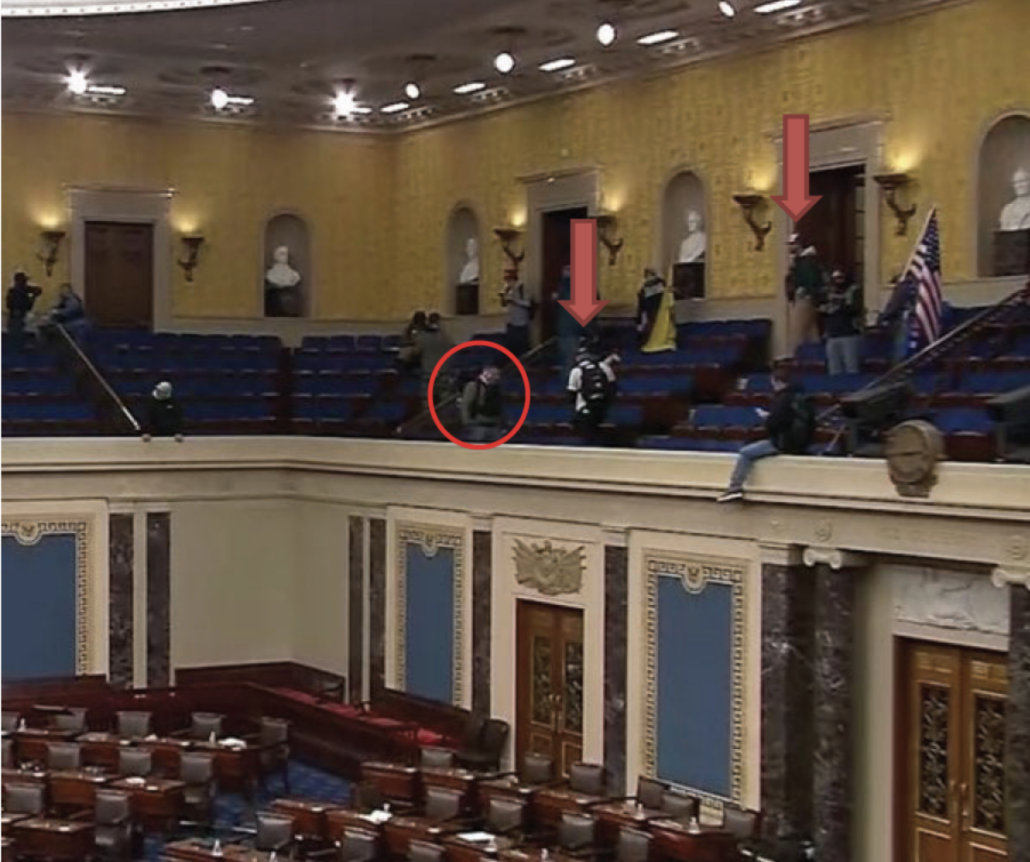The January 6 Committee Report is out.
As many people have pointed out, the report focuses on Donald Trump, telling the story about how he riled up a mob with The Big Lie and then did nothing as they launched a terrorist attack on the Capitol and those within in, especially Trump’s Vice President.
But even in telling a story about Donald Trump, the report has glaring blind spots. Some of those blind spots were created by the limits on the Committee’s investigative authorities, some were created by the Committee’s (perhaps resultant) limited understanding of the attack.
To demonstrate those blind spots, I wanted to show what the report includes in the body of the report about December 27 (some of these may be out of order and I need to clean it up, but this will be a useful demonstration). Here are things that happened on December 27, 2020:
- Bernie Kerik publicly attacks Pat Toomey for opposing fraud (the Report ties this attacks to physical threats against officials opposed to Trump’s fraud)
- Mark Meadows continues to pressure Georgia
- Doug Mastriano speaks to Trump and feeds members of Congress bullshit
- Trump attempts to get Jeffrey Rosen and Richard Donoghue to endorse his fraud message and — failing that — threatens to replace Rosen
- With Trump’s blessing, Louie Gohmert files suit against Mike Pence
- Trump pardons Stone and they talk about January 6
- Trump gets more involved in planning January 6, which leads to a plan to have his supporters march on the Capitol and then a plan for him to march
- The FBI creates a system to collect threats related to the “election certification” on January 6 by using a tag, “CERTUNREST
Some of these events (such as the Louie Gohmert lawsuit) were obviously in the work before December 27, but this provides a good read of where the parallel strands of the attack were on that particular day.
But given what we know, the far most important event of the day was the increased involvement by the White House in January 6. This was the moment the plans for January 6 started becoming a plan for a coup.
As you look at what gets included in the report, however, you get a sense of how little the Committee learned about how that happened.
In one section, the report notes that that’s the day Trump pardoned Roger Stone and — probably at the same face-to-face meeting at Mar-a-Lago — discussed plans for January 6, including a plan for Trump to speak.
In another section, the report notes that a former staffer named Justin Caporale was asked to get involved in planning the day and also that during a dinner with Jr and Kimberly Guilfoyle, Guilfoyle called Carolyn Wren and learned about the busses and other plans for the day. That’s what led to an increased White House focus on January 6. But because the Committee couldn’t get the comms from key participants, they can’t tell you how much planning happened or with whom.
The report doesn’t provide a timeline for how those three events happened: Stone, Caporale, Wren (indeed, this is one area where the report’s selectivity about when to include metadata for communications and when not to is infuriating, because we can’t even make that timeline now). We learn only that Wren texted Guilfoyle at 7:10PM. That obscurity is especially troubling, because Wren was in touch with people who were in touch with Stone, and the report actually relies on a story about Stone for part of its narrative about the Guilfoyle-Wren conversation. (The report’s discussion of the ties between Alex Jones, Wren, the militias, and Stone, is particularly weak; while that is no doubt a reflection of the limited tools the committee had to obtain materials from those who did not cooperate, the committee also eschewed primary sources that would have provided background that would be critical to that story.) It admits that non-cooperation from Meadows, Dan Scavino, and Caporale thwarted the Committee’s own efforts to build out this timeline. Elsewhere, it calls into question of the key witnesses involved, including both Max Miller and Tony Ornato, on whose its awareness of expanded planning relies.
We simply don’t know how it happened that the plans for January 6 began to focus much more on an attack on the Capitol.
We do know the FBI finally recognized it as a threat. We do know that members of Congress were overtly attacking the election (and Pence), in the form of the lawsuit against Pence.
And we know that the most important detail of the longest passage involving December 27 (as well as significant focus in the executive summary), of the discussions between Trump and top DOJ officials, involved the instruction, “Just say the election was corrupt and leave the rest to me and the Republican Congressmen.” He said that, though, on a day when people like Kerik were beginning to ratchet up the pressure, with implicit threats, against GOP members of Congress who would refuse to go along.
The report focuses far more on proving that Trump was pushing fraudulent claims than laying out how Trump’s plans turned to a coup.
All that work on the Big Lie is important (and accessible to a committee without the ability to serve warrants for content). It is largely a measure of the cooperation the committee got — from Jeffrey Rosen but not from Stone, access to Cassidy Hutchinson’s second-hand knowledge of these events because Caporale was limiting his own cooperation and Meadows and Scavino provided none.
But it should come with a focus on the blind spots that remain, which happen to be the blind spots about the people who could have coordinated Trump’s own plans with those of the armed mob.
Update: This, from the deposition of Robert Peede, describe the calls referred to in the report. Peede was with Trump in Mar-a-Lago at the time of these calls.
5:16PM: Robert Peede to Max Miller (10 minutes)
5:51PM Trump tweet
6:19PM: Peede to Miller (3 minutes)
6:22?PM: Miller to Justin Caporale (<10 minutes)
Miller to Peede (2 minutes)
Peede to Ornato (3 minutes)
7:10: Wren to Guilfoyle text
Bernie Kerik attacks a Member of Congress opposed to Trump’s fraud
On December 27th, Kerik suggested that Senator Pat Toomey (R-PA) was “corrupt” and said that “for any Pennsylvania official to certify their vote, it’s malfeasance and criminal.”290 That was entirely consistent with Kerik’spast tweets about the election, one of which apparently called public officials “who betrayed” President Trump “spineless disloyal maggots.”291 It wasn’t just rhetoric, however, because, as described below, people showed-up outside certain officials’ home—sometimes menacingly—and, of course, showed up at the Capitol on January 6th.
[snip]
Mark Meadows pressures Georgia
Four days later, Meadows texted Deputy Secretary of State Fuchs, in which he asked, “[i]s there a way to speed up Fulton county signature verification in order to have results before Jan 6 if the trump campaign assist[s] financially.”242 Fuchs wrote in response that she “Will answer ASAP.”243
[snip]
Doug Mastriano feeds bullshit to Trump and others in Congress
Mastriano also sent emails indicating that he spoke with President Trump on December 27th, 28th, and 30th, along with files that President Trump had requested or that he had promised to him.267
[snip]
Trump attempts to get Jeffrey Rosen and Richard Donoghue to buy his fraud message and — failing that — threatens to replace Rosen
On December 27, 2020, President Trump called Acting Attorney General Rosen once again. At some point during the lengthy call, Rosen asked that Acting Deputy Attorney General Donoghue be conferenced in.116 According to Donoghue’s contemporaneous notes, Trump referenced three Republican politicians, all of whom had supported the President’s election lies and the“Stop the Steal” campaign.117 One was Representative Scott Perry. Another was Doug Mastriano, a State senator from Pennsylvania who would later beon the grounds of the U.S. Capitol during the January 6th attack.118 President Trump also referenced Representative Jim Jordan from Ohio, praising him as a “fighter.”119 Representatives Perry and Jordan had often teamed up to spread lies about the election. The two spoke at a “Stop the Steal” rally in front of the Pennsylvania State capitol in Harrisburg, just days after the November election.120 The pair also pressed their conspiratorial case during interviews with friendly media outlets.121
President Trump made a “stream of allegations” during the December 27th call.122 As reflected in his notes, Donoghue considered the call to be an“escalation of the earlier conversations,” with the President becoming more adamant that “we weren’t doing our job.”123 President Trump trafficked in “conspiracy theories” he had heard from others, and Donoghue sought to “make it clear to the President these allegations were simply not true.”124 Donoghue sought to “correct” President Trump “in a serial fashion as he moved from one theory to another.”125
The President returned to the discredited ASOG report, which former Attorney General Barr had already dismissed as complete nonsense. ASOG had claimed—based on no evidence—that the Dominion voting machines in Antrim County, Michigan had suffered from a 68 percent error rate. As noted above and in Chapter 1, that was not close to being true.
Bipartisan election officials in Antrim County completed a hand recount of all machine-processed ballots on December 17, 2020, which should have ended the lies about Dominion’s voting machines.126 The net difference between the machine count and the hand recount was only 12 out of 15,718total votes.127 The machines counted just one vote more for former Vice President Biden than was tallied during the hand recount.128 Donoghue informed the President that he “cannot and should not be relying on” ASOG’s claim, because it was “simply not true.”129 This did not stop the President from later repeating the debunked allegation multiple times, including during his January 6th speech at the Ellipse.130
Acting Deputy Attorney General Donoghue debunked a “series” of other conspiracy theories offered by President Trump during the December 27th call as well. One story involved a truck driver “who claimed to have moved an entire tractor trailer of ballots from New York to Pennsylvania.”131 There was no truth to the story. The FBI “interviewed witnesses at the front end and the back end of” the truck’s transit route, “looked at loading manifests,” questioned the truck driver, and concluded that there were no ballots in the truck.132
President Trump then returned to the conspiracy theory about voting inDetroit. Former Attorney General Barr had already debunked the claim that a massive number of illegal votes had been dumped during the middle of the night, but the President would not let it go. President Trump alleged that someone “threw the poll watchers out,” and “you don’t even need to look at the illegal aliens voting—don’t need to. It’s so obvious.”133 The President complained that the “FBI will always say there’s nothing there,”because while the Special Agents (“the line guys”) supported him, the Bureau’s leadership supposedly did not.134 This was inconsistent with Donoghue’s view.135 But President Trump complained that he had “made some bad decisions on leadership” at the FBI.136
President Trump also “wanted to talk a great deal about Georgia, [and] the State Farm Arena video,” claiming it was “fraud staring you right in the face.”137 President Trump smeared Ruby Freeman, a Georgia election worker who was merely doing her job, as a “Huckster” and an “Election scammer.”138 President Trump said the “networks,” meaning the television networks, had “magnified the tape and saw them running them [ballots] through repeatedly.”139 The President repeated the lie that Democrats had “[c]losed the facility and then came back with hidden ballots under thet able.”140 He suggested that both Rosen and Donoghue “go to Fulton County and do a signature verification.” They would “see how illegal it is”and “find tens of thousands” of illegal ballots.141
President Trump “kept fixating” on the supposed suitcase in the video.142 But Acting Deputy Attorney General Donoghue debunked the President’s obsession. “There is no suitcase,” Donoghue made clear.143 Donoghue explained that the DOJ had looked at the video and interviewed multiple witnesses. The “suitcase” was an official lock box filled with genuine votes.144 And election workers simply did not scan ballots for former Vice President Biden multiple times.145 All of this was recorded by security cameras.146
In response to what President Trump was saying during the conversation, Rosen and Donoghue tried to make clear that the claims the President made weren’t supported by the evidence. “You guys must not be followingthe internet the way I do,” the President remarked.147 But President Trump was not finished peddling wild conspiracy theories.
The President pushed the claim that Pennsylvania had reported 205,000more votes than there were voters in the state.148 “We’ll look at whether we have more ballots in Pennsylvania than registered voters,” Acting AttorneyGeneral Rosen replied, according to Donoghue. They “[s]hould be able to check that out quickly.”149 But Rosen wanted President Trump to “understand that the DOJ can’t and won’t snap its fingers and change the outcome of the election. It doesn’t work that way.”150 “
I don’t expect you to do that,” President Trump responded. “Just say the election was corrupt and leave the rest to me and the Republican Congressmen.”151
Donoghue explained this “is an exact quote from the President.”152
“We have an obligation to tell people that this was an illegal, corrupt election,” President Trump told the DOJ team at another point in the call.153 President Trump insisted this was DOJ’s “obligation,” even though Rosenand Donoghue kept telling him there was no evidence of fraud sufficient tooverturn the outcome of the election. “We are doing our job,” Donoghue informed the President. “Much of the info you’re getting is false.”154
The call on December 27th was contentious for additional reasons. President Trump did not want to accept that the Department of Justice wasn ot an arm of his election campaign. He wanted to know why the Department did not assist in his campaign’s civil suits against States. There was asimple answer: There was no evidence to support the campaign’s claims of fraud.155
Donoghue and Rosen also “tried to explain to the President on this occasion and on several other occasions that the Justice Department has a very important, very specific, but very limited role in these elections.”156 The States “run their elections” and DOJ is not “quality control for the States.”157 DOJ has “a mission that relates to criminal conduct in relation tofederal elections” and also has “related civil rights responsibilities.”158 But DOJ cannot simply intervene to alter the outcome of an election or support a civil suit.159
When President Trump made these demands on December 27th, it wasalready crystal clear that the Department of Justice had found no evidence of systemic fraud.160 The Department simply had no reason to assert that the 2020 Presidential contest was “an illegal corrupt election.”161
“People tell me Jeff Clark is great” and that “I should put him in,” President Trump said on the call. “People want me to replace the DOJ leadership.”162 Donoghue responded “[S]ir, that’s fine, you should have the leadership you want, but understand, changing the leadership in the Department won’t change anything.”163
The President did not really care what facts had been uncovered by theDepartment of Justice. President Trump just wanted the Department to saythe election was corrupt, so he and the Republican Congressmen could exploit the statement in the days to come, including on January 6th. Andwhen Rosen and Donoghue resisted the President’s entreaties, he openly mused about replacing Rosen with someone who would do the President’s bidding. 4.8
CONGRESSMAN SCOTT PERRY CALLS DONOGHUE
Toward the end of the December 27th call, President Trump asked Donoghue for his cell number.164 Later that day, Representative Perry called Donoghue to press the President’s case.165
[snip]
Donoghue took notes during his conversation with Representative Perry and provided those notes to the Select Committee.169 The notes reflect that when Representative Perry called Donoghue on December 27th, Representative Perry explained that President Trump asked him to call and that he, Representative Perry, did not think DOJ had been doing its job on the election.170 Representative Perry brought up other, unrelated matters and argued that the “FBI doesn’t always do the right thing in all instances.”171 Representative Perry also brought up Jeff Clark. He said he liked him andthought that Clark “would do something about this,” meaning the electionfraud allegations.172
On the evening of December 27th, Representative Perry emailed Donoghue a set of documents alleging significant voting fraud had occurred inPennsylvania.173 One document asserted that election authorities had counted 205,000 more votes than had been cast.174 Representative Perry also shared this same claim on Twitter the following day.175 President Trump kept raising the same claim. Sometimes there was an alleged discrepancy of 205,000 votes, other times it was supposedly 250,000 votes.176 Either way, it was not true.
Acting Deputy Attorney General Donoghue forwarded Representative Perry’s email to Scott Brady, who was the U.S. Attorney for the Western District of Pennsylvania at the time.177 As Brady soon discovered, there wasno discrepancy.178 President Trump’s supporters came up with the claim by comparing the Pennsylvania Secretary of State’s website, which reportedthe total number of votes as 5.25 million, to a separate State election registry, which showed only 5 million votes cast.179 The problem was simple: Pennsylvania’s election site had not been updated.180 The totals for four counties had not yet been reported on the election site. Once those votes were counted on the site, the totals matched. This was simply not an example of fraud, as President Trump, Representative Perry and others would have it.
With Trump’s blessing, Louie Gohmert files suit against Mike Pence
One of President Trump’s congressional allies, Representative Louie Gohmert (R–TX), pushed a version of Eastman’s theory in the courts. OnDecember 27, 2020, Representative Gohmert and several of the Trump Campaign’s fake electors for the State of Arizona (including Republican Party Chair Kelli Ward) filed suit against Vice President Pence in the U.S. District Court for the Eastern District of Texas.67 As Ward explained to Marc Short in a phone call the day the suit was filed, President Trump was aware of the lawsuit and had signed off on it: “We wouldn’t have done that without the president telling us it was okay,” she told him.68
In the suit, the Plaintiffs alleged that there were “competing slates” of electors from five States.69 They asked the court to rule that portions of theElectoral Count Act of 1887 were unconstitutional and that “the TwelfthAmendment contains the exclusive dispute resolution mechanisms” for determining an objection raised by a Member of Congress to the electors submitted by any State.70 Essentially, Representative Gohmert was askingthe court to tell Vice President Pence that he was prohibited from followingthe procedures set forth in the Electoral Count Act. Much like Eastman’s theory, the Gohmert plaintiffs asserted that the Vice President has the “exclusive authority and sole discretion” to determine which electoral votes to count.71
Although the Gohmert suit was premised on the same theory Eastman advocated, Eastman did not agree with the decision to file suit. Eastman argued that filing a suit against the Vice President had “close[ ] to zero” chance of succeeding, and there was a “very high” risk that the court would issue an opinion stating that “Pence has no authority to reject the Bidencertified ballots.”72
Trump pardons Stone and they talk about January 6
In July 2020, President Trump granted Stone clemency after he was convicted of lying to Congress and other charges.243 Then, on December 23rd, President Trump pardoned Stone.244 Several days later, at a dinner onthe evening of December 27th, Stone thanked President Trump. In a post on Parler, Stone wrote that he “thanked President Trump in person tonight forpardoning me” and also recommended to the President that he “appoint a special counsel” to stop “those who are attempting to steal the 2020 election through voter fraud.” Stone also wrote that he wanted “to ensurethat Donald Trump continues as our president.”245 Finally, he added: “#StopTheSteal” and “#rogerstonedidnothingwrong.”246 The Select Committee has learned that Stone discussed the January 6th event with the President, likely at this same dinner on December 27th.247 The President told Stone he “was thinking of speaking.”248
Trump gets more involved in planning January 6
On the evening of December 27th, President Trump boosted the upcoming event on Twitter: “See you in Washington, DC, on January 6th. Don’t miss it. Information to follow!”415 The Select Committee learned that this tweet came after the White House spoke with a former Trump staffer, Justin Caporale, who was asked to help produce the Ellipse rally.416 That same evening, the President had dinner with Donald Trump, Jr., and his girlfriend Kimberly Guilfoyle,417 who spoke with rally organizer Caroline Wren during the meal.418 Wren also texted Guilfoyle talking points that described her ambitions for the event, saying that “buses of people are coming in from all over the country to support you. It’s going to be huge, we are also adding in programming the night of January 5th.”419
After Guilfoyle’s call with Wren, there was a series of calls among the senior White House staff,420 likely underscoring the seriousness of the White House’s interest in the event.
Within a few days, the White House began to take a more direct role incoordinating the rally at the Ellipse.421 In a December 29th text to Wren, Caporale wrote that after the President’s planned speech there “maybe [sic] a call to action to march to the [C]apitol and make noise.”422
This is the earliest indication uncovered by the Select Committee that the President planned to call on his supporters to march on the U.S. Capitol. But it wasn’t the last. On January 2nd, rally organizer Katrina Pierson informed Wren that President Trump’s Chief of Staff, Mark Meadows, had said the President was going to “call on everyone to march to the [C]apitol.”423
Inside the White House, the President’s intent was well-known. Cassidy Hutchinson, an aide to Meadows, recalled in her testimony that she overheard discussions to this effect toward the end of December or early January. One such discussion included an exchange between Meadows andRudolph Giuliani that occurred on January 2nd.424 Hutchinson understood that President Trump wanted to have a crowd at the Capitol in connection with what was happening inside—the certification of the electoral count.425 Hutchinson also recalled that President Trump’s allies in Congress were aware of the plan. During a call with members of the House FreedomCaucus, the idea of telling people to go to the Capitol was discussed as a way to encourage Congress to delay the electoral college certification and send it back to the States.426
On January 4th, WFAF’s Kylie Kremer informed Mike Lindell, the CEO of MyPillow and an ally of President Trump, that “POTUS is going to have us march there [the Supreme Court]/the Capitol” but emphasized that the plan“stays only between us.”427
The “Stop the Steal” coalition was aware of the President’s intent. OnJanuary 5th, Ali Alexander sent a text to a journalist saying: “Ellipse thenUS capitol [sic]. Trump is supposed to order us to the capitol [sic] at the endof his speech but we will see.”428
290. Bernard B. Kerik (@BernardKerik), Twitter, Dec. 27, 2020 11:53 a.m. ET, available at https:// twitter.com/bernardkerik/status/1343238609768501253. 291. Bernard B. Kerik (@BernardKerik), Twitter, Dec. 13, 2020 1:05 a.m. ET, available at https:// twitter.com/bernardkerik/status/1338001989846888448.
[snip]
242. Documents on file with the Select Committee to Investigate the January 6th Attack on the United States Capitol (Mark Meadows Production), MM014152 (December 27, 2020 text message at 5:18 p.m. from Mark Meadows to Jordan Fuchs). 243. Documents on file with the Select Committee to Investigate the January 6th Attack on the United States Capitol (Mark Meadows Production), MM014153 (December 27, 2020 text message at 5:20 p.m. from Jordan Fuchs to Mark Meadows).
[snip]
117. Documents on file with the Select Committee to Investigate the January 6th Attack on the United States Capitol (Department of Justice Production), HCOR-Pre-Certification-Events07282021-000735. 118. Documents on file with the Select Committee to Investigate the January 6th Attack on the United States Capitol (Department of Justice Production), HCOR-Pre-Certification-Events07282021-000735; Ryan Deto, “Sen. Mastriano and Former State Rep. Saccone among TrumpSupporters who Occupied U.S. Capitol,” Pittsburgh City Paper, (Jan. 6, 2021), available at https://www.pghcitypaper.com/pittsburgh/sen-mastriano-and-former-state-rep-sacconeamong-trump-supporters-who-occupied-us-capitol/Content?oid=18690728; Erin Bamer, “Mastriano Defends Protest Appearance; Other GOP Lawmakers Say Little,” York Dispatch, (Jan. 7, 2021), available at https://www.yorkdispatch.com/story/news/2021/01/07/ mastriano-at-no-point-did-he-storm-us-capitol/6579049002/. 119. Select Committee to Investigate the January 6th Attack on the United States Capitol, Transcribed Interview of Richard Peter Donoghue, (Oct. 1, 2021), pp. 47-50; see also Documents on file with the Select Committee to Investigate the January 6th Attack on the United States Capitol (Department of Justice Production), HCOR-Pre-Certification-Events-07282021- 000735.
120. Dan Geiter, “Rally to ‘Stop the Steal’ of the 2020 Election” PennLive, (Nov. 5, 2020) availableat https://www.pennlive.com/galleries/J3FJ24LCKVCT5OW3U2TJ6BV4RE/. 121. See, e.g., Scott Perry for Congress, “#StopTheSteal,” Facebook, November 6, 2020, available at https://www.facebook.com/watch/?v=406418637058079. 122. Select Committee to Investigate the January 6th Attack on the United States Capitol, Transcribed Interview of Richard Peter Donoghue, (Oct. 1, 2021), pp. 47-48, 53.
123. Select Committee to Investigate the January 6th Attack on the United States Capitol, Hearing on the January 6th Investigation, 117th Cong., 2d sess., (June 23, 2022), available at https://www.govinfo.gov/committee/house-january6thSelect; Documents on file with the Select Committee to Investigate the January 6th Attack on the United States Capitol (Department of Justice Production), HCOR-Pre-Certification-Events-07282021-000739 (December 27, 2020, handwritten notes from Richard Donoghue about call with President Trump). 124. Select Committee to Investigate the January 6th Attack on the United States Capitol, Hearing on the January 6th Investigation, 117th Cong., 2d sess., (June 23, 2022), available at https://www.govinfo.gov/committee/house-january6thSelect; Documents on file with the Select Committee to Investigate the January 6th Attack on the United States Capitol (Department of Justice Production), HCOR-Pre-Certification-Events-07282021-000739 (December 27, 2020, handwritten notes from Richard Donoghue about call with President Trump). 125. Select Committee to Investigate the January 6th Attack on the United States Capitol, Hearing on the January 6th Investigation, 117th Cong., 2d sess., (June 23, 2022), available at https://www.govinfo.gov/committee/house-january6thSelect; Documents on file with the Select Committee to Investigate the January 6th Attack on the United States Capitol (Department of Justice Production), HCOR-Pre-Certification-Events-07282021-000739 (December 27, 2020, handwritten notes from Richard Donoghue about call with President Trump). 126. “Hand Audit of All Presidential Election Votes in Antrim County Confirms Previously Certified Results, Voting Machines Were Accurate,” Michigan Secretary of State, (Dec. 17, 2020), available at https://www.michigan.gov/sos/resources/news/2020/12/17/hand-audit-of-allpresidential-election-votes-in-antrim-county-confirms-previously-certified-result. 127. “Hand Audit of All Presidential Election Votes in Antrim County Confirms Previously Certified Results, Voting Machines Were Accurate,” Michigan Secretary of State, (Dec. 17, 2020), available at https://www.michigan.gov/sos/resources/news/2020/12/17/hand-audit-of-allpresidential-election-votes-in-antrim-county-confirms-previously-certified-result. 128. “Hand Audit of All Presidential Election Votes in Antrim County Confirms Previously Certified Results, Voting Machines Were Accurate,” Michigan Secretary of State, (Dec. 17, 2020), available at https://www.michigan.gov/sos/resources/news/2020/12/17/hand-audit-of-allpresidential-election-votes-in-antrim-county-confirms-previously-certified-result. 129. Select Committee to Investigate the January 6th Attack on the United States Capitol, Hearing on the January 6th Investigation, 117th Cong., 2d sess., (June 23, 2022), available at https://www.govinfo.gov/committee/house-january6thSelect; Select Committee to Investigate the January 6th Attack on the United States Capitol, Transcribed Interview of RichardPeter Donoghue, (Oct. 1, 2021), p. 60; Documents on file with the Select Committee to Investigate the January 6th Attack on the United States Capitol (Department of Justice Production), HCOR-Pre-Certification-Events-07282021-000739 (December 27, 2020, handwrittennotes from Richard Donoghue about call with President Trump). 130. Select Committee to Investigate the January 6th Attack on the United States Capitol, Hearing on the January 6th Investigation, 117th Cong., 2d sess., (June 23, 2022), available at https://www.govinfo.gov/committee/house-january6th?path=/browsecommittee/chamber/house/committee/january6th. 131. Select Committee to Investigate the January 6th Attack on the United States Capitol, Hearing on the January 6th Investigation, 117th Cong., 2d sess., (June 23, 2022), available at https://www.govinfo.gov/committee/house-january6thSelect; Select Committee to Investigate the January 6th Attack on the United States Capitol, Transcribed Interview of RichardPeter Donoghue, (Oct. 1, 2021), p. 60. 132. Select Committee to Investigate the January 6th Attack on the United States Capitol, Hearing on the January 6th Investigation, 117th Cong., 2d sess., (June 23, 2022), available at https://www.govinfo.gov/committee/house-january6thSelect; Select Committee to Investigate the January 6th Attack on the United States Capitol, Transcribed Interview of RichardPeter Donoghue, (Oct. 1, 2021), p. 60; Documents on file with the Select Committee to Investigate the January 6th Attack on the United States Capitol (Department of Justice Production), HCOR-Pre-Certification-Events-07282021-000739 (December 27, 2020, handwrittennotes from Richard Donoghue about call with President Trump). 133. Select Committee to Investigate the January 6th Attack on the United States Capitol, Transcribed Interview of Richard Peter Donoghue, (Oct. 1, 2021), p. 55; Documents on file with the Select Committee to Investigate the January 6th Attack on the United States Capitol (Department of Justice Production), HCOR-Pre-Certification-Events-07282021-000737 (December 27, 2020, handwritten notes from Richard Donoghue about call with President Trump). 134. Select Committee to Investigate the January 6th Attack on the United States Capitol, Transcribed Interview of Richard Peter Donoghue, (Oct. 1, 2021), p. 55; Documents on file with the Select Committee to Investigate the January 6th Attack on the United States Capitol (Department of Justice Production), HCOR-Pre-Certification-Events-07282021-000737 (December 27, 2020, handwritten notes from Richard Donoghue about call with President Trump). 135. Select Committee to Investigate the January 6th Attack on the United States Capitol, Transcribed Interview of Richard Peter Donoghue, (Oct. 1, 2021), p. 55. 136. Select Committee to Investigate the January 6th Attack on the United States Capitol, Transcribed Interview of Richard Peter Donoghue, (Oct. 1, 2021), pp. 55-56; Documents on file with the Select Committee to Investigate the January 6th Attack on the United States Capitol (Department of Justice Production), HCOR-Pre-Certification-Events-07282021-000739 (December 27, 2020, handwritten notes from Richard Donoghue about call with President Trump). 137. Select Committee to Investigate the January 6th Attack on the United States Capitol, Hearing on the January 6th Investigation, 117th Cong., 2d sess., (June 23, 2022), available at https://www.govinfo.gov/committee/house-january6thSelect. 138. Select Committee to Investigate the January 6th Attack on the United States Capitol, Transcribed Interview of Richard Peter Donoghue, (Oct. 1, 2021), p. 54; Documents on file with the Select Committee to Investigate the January 6th Attack on the United States Capitol (Department of Justice Production), HCOR-Pre-Certification-Events-07282021-000739 (December 27, 2020, handwritten notes from Richard Donoghue about call with President Trump). 139. Select Committee to Investigate the January 6th Attack on the United States Capitol, Transcribed Interview of Richard Peter Donoghue, (Oct. 1, 2021), p. 54; Documents on file with the Select Committee to Investigate the January 6th Attack on the United States Capitol (Department of Justice Production), HCOR-Pre-Certification-Events-07282021-000739 (December 27, 2020, handwritten notes from Richard Donoghue about call with President Trump). 140. Select Committee to Investigate the January 6th Attack on the United States Capitol, Transcribed Interview of Richard Peter Donoghue, (Oct. 1, 2021), p. 54; Documents on file with the Select Committee to Investigate the January 6th Attack on the United States Capitol (Department of Justice Production), HCOR-Pre-Certification-Events-07282021-000739 (December 27, 2020, handwritten notes from Richard Donoghue about call with President Trump).
141. Select Committee to Investigate the January 6th Attack on the United States Capitol, Transcribed Interview of Richard Peter Donoghue, (Oct. 1, 2021), p. 64; Documents on file with the Select Committee to Investigate the January 6th Attack on the United States Capitol (Department of Justice Production), HCOR-Pre-Certification-Events-07282021-000741 (December 27, 2020, handwritten notes from Richard Donoghue about call with President Trump). 142. Select Committee to Investigate the January 6th Attack on the United States Capitol, Transcribed Interview of Richard Peter Donoghue, (Oct. 1, 2021), p. 60. 143. Select Committee to Investigate the January 6th Attack on the United States Capitol, Transcribed Interview of Richard Peter Donoghue, (Oct. 1, 2021), p. 60. 144. Select Committee to Investigate the January 6th Attack on the United States Capitol, Transcribed Interview of Richard Peter Donoghue, (Oct. 1, 2021), pp. 60-61. 145. Select Committee to Investigate the January 6th Attack on the United States Capitol, Transcribed Interview of Richard Peter Donoghue, (Oct. 1, 2021), pp. 60-61. 146. Select Committee to Investigate the January 6th Attack on the United States Capitol, Transcribed Interview of Richard Peter Donoghue, (Oct. 1, 2021), pp. 60-61. 147. Select Committee to Investigate the January 6th Attack on the United States Capitol, Transcribed Interview of Richard Peter Donoghue, (Oct. 1, 2021), pp. 54-55; Documents on file with the Select Committee to Investigate the January 6th Attack on the United States Capitol (Department of Justice Production), HCOR-Pre-Certification-Events-07282021-000737 (December 27, 2020, handwritten notes from Richard Donoghue about call with President Trump). 148. Select Committee to Investigate the January 6th Attack on the United States Capitol, Transcribed Interview of Richard Peter Donoghue, (Oct. 1, 2021), pp. 54, 58; Documents on file with the Select Committee to Investigate the January 6th Attack on the United States Capitol (Department of Justice Production), HCOR-Pre-Certification-Events-07282021-000737, HCOR-Pre-Certification-Events-07282021-000738 (December 27, 2020, handwritten notes from Richard Donoghue about call with President Trump). 149. Select Committee to Investigate the January 6th Attack on the United States Capitol, Transcribed Interview of Richard Peter Donoghue, (Oct. 1, 2021), pp. 54, 58; Documents on file with the Select Committee to Investigate the January 6th Attack on the United States Capitol (Department of Justice Production), HCOR-Pre-Certification-Events-07282021-000737, HCOR-Pre-Certification-Events-07282021-000738 (December 27, 2020, handwritten notes from Richard Donoghue about call with President Trump). 150. Select Committee to Investigate the January 6th Attack on the United States Capitol, Transcribed Interview of Richard Peter Donoghue, (Oct. 1, 2021), pp. 54, 58; Documents on file with the Select Committee to Investigate the January 6th Attack on the United States Capitol (Department of Justice Production), HCOR-Pre-Certification-Events-07282021-000737, HCOR-Pre-Certification-Events-07282021-000738 (December 27, 2020, handwritten notes from Richard Donoghue about call with President Trump). 151. Select Committee to Investigate the January 6th Attack on the United States Capitol, Transcribed Interview of Richard Peter Donoghue, (Oct. 1, 2021), p. 58; Documents on file with the Select Committee to Investigate the January 6th Attack on the United States Capitol (Department of Justice Production), HCOR-Pre-Certification-Events-07282021-000738, HCORPre-Certification-Events-07282021-000739 (December 27, 2020, handwritten notes fromRichard Donoghue about call with President Trump). 152. Select Committee to Investigate the January 6th Attack on the United States Capitol, Transcribed Interview of Richard Peter Donoghue, (Oct. 1, 2021), p. 58. Trump also mentioned the possibility of the DOJ saying the “election is corrupt or suspect or not reliable” during a public press conference. “We told him we were not going to do that,” Donoghue explained. Id. at p. 59.
153. Select Committee to Investigate the January 6th Attack on the United States Capitol, Transcribed Interview of Richard Peter Donoghue, (Oct. 1, 2021), p. 62; Documents on file with the Select Committee to Investigate the January 6th Attack on the United States Capitol (Department of Justice Production), HCOR-Pre-Certification-Events-07282021-000740 (December 27, 2020, handwritten notes from Richard Donoghue about call with President Trump). 154. Select Committee to Investigate the January 6th Attack on the United States Capitol, Transcribed Interview of Richard Peter Donoghue, (Oct. 1, 2021), p. 60; Documents on file with the Select Committee to Investigate the January 6th Attack on the United States Capitol (Department of Justice Production), HCOR-Pre-Certification-Events-07282021-000739, HCORPre-Certification-Events-07282021-000740 (December 27, 2020, handwritten notes fromRichard Donoghue about call with President Trump). 155. Select Committee to Investigate the January 6th Attack on the United States Capitol, Transcribed Interview of Richard Peter Donoghue, (Oct. 1, 2021), p. 61. 156. Select Committee to Investigate the January 6th Attack on the United States Capitol, Hearing on the January 6th Investigation, 117th Cong., 2d sess., (June 23, 2022), available at https://www.govinfo.gov/committee/house-january6thSelect. 157. Select Committee to Investigate the January 6th Attack on the United States Capitol, Hearing on the January 6th Investigation, 117th Cong., 2d sess., (June 23, 2022), available at https://www.govinfo.gov/committee/house-january6thSelect. 158. Select Committee to Investigate the January 6th Attack on the United States Capitol, Hearing on the January 6th Investigation, 117th Cong., 2d sess., (June 23, 2022), available at https://www.govinfo.gov/committee/house-january6thSelect. 159. Select Committee to Investigate the January 6th Attack on the United States Capitol, Hearing on the January 6th Investigation, 117th Cong., 2d sess., (June 23, 2022), available at https://www.govinfo.gov/committee/house-january6thSelect. 160. Donoghue testified before the Select Committee: “There were isolated instances of fraud. None of them came close to calling into question the outcome of the election in any individual state.” Select Committee to Investigate the January 6th Attack on the United States Capitol, Hearing on the January 6th Investigation, 117th Cong., 2d sess., (June 23, 2022), available at https://www.govinfo.gov/committee/house-january6thSelect. 161. Select Committee to Investigate the January 6th Attack on the United States Capitol, Transcribed Interview of Richard Peter Donoghue, (Oct. 1, 2021), p. 62; Documents on file with the Select Committee to Investigate the January 6th Attack on the United States Capitol (Department of Justice Production), HCOR-Pre-Certification-Events-07282021-000740 (December 27, 2020, handwritten notes from Richard Donoghue about call with President Trump). 162. Select Committee to Investigate the January 6th Attack on the United States Capitol, Transcribed Interview of Richard Peter Donoghue, (Oct. 1, 2021), p. 62. 163. Select Committee to Investigate the January 6th Attack on the United States Capitol, Transcribed Interview of Richard Peter Donoghue, (Oct. 1, 2021), p. 62. 164. Select Committee to Investigate the January 6th Attack on the United States Capitol, Transcribed Interview of Richard Peter Donoghue, (Oct. 1, 2021), p. 65. 165. Select Committee to Investigate the January 6th Attack on the United States Capitol, Transcribed Interview of Richard Peter Donoghue, (Oct. 1, 2021), pp. 72-75. 166. Dan Gleiter, “Rally to ‘Stop the Steal’ of the 2020 Election,” Penn Live, (Nov. 5, 2020), available at https://www.pennlive.com/galleries/J3FJ24LCKVCT5OW3U2TJ6BV4RE/. 167. Letter from the Office of Rep. Lance Gooden and Signed by 26 other Members of Congress to the President of the United States, Dec. 9, 2020, available at https://www.politico.com/ f/?id=00000176-4701-d52c-ad7e-d7fdbfe50000.
168. Motion for Leave to File Amicus Brief by U.S. Representative Mike Johnson and 125 other Members, Texas v. Pennsylvania, 592 U.S. ____ (Dec. 10, 2020) (No. 155, Orig.), available at https://www.supremecourt.gov/DocketPDF/22/22O155/163550/ 20201211132250339_Texas%20v.%20Pennsylvania%20Amicus%20Brief%20of%20126%20 Representatives%20–%20corrected.pdf. 169. Select Committee to Investigate the January 6th Attack on the United States Capitol, Transcribed Interview of Richard Peter Donoghue, (Oct. 1, 2021), pp. 72-73; Documents on file with the Select Committee to Investigate the January 6th Attack on the United States Capitol (Department of Justice Production), HCOR-Pre-CertificationEvents-07262021-000705, HCOR-Pre-CertificationEvents-07262021-000706, (Dec. 27, 2020, handwritten notes). Donoghue’s handwritten notes from the call are dated Dec. 28, 2020, but he confirmed the call took place on Dec. 27. 170. Select Committee to Investigate the January 6th Attack on the United States Capitol, Transcribed Interview of Richard Peter Donoghue, (Oct. 1, 2021), pp. 72-73; Documents on file with the Select Committee to Investigate the January 6th Attack on the United States Capitol (Department of Justice Production), HCOR-Pre-CertificationEvents-07262021-000705, HCOR-Pre-CertificationEvents-07262021-000706, (Dec. 27, 2020, handwritten notes). 171. Select Committee to Investigate the January 6th Attack on the United States Capitol, Transcribed Interview of Richard Peter Donoghue, (Oct. 1, 2021), pp. 72-73; Documents on file with the Select Committee to Investigate the January 6th Attack on the United States Capitol (Department of Justice Production), HCOR-Pre-CertificationEvents-07262021-000705, HCOR-Pre-CertificationEvents-07262021-000705, (Dec. 27, 2020, handwritten notes). 172. Select Committee to Investigate the January 6th Attack on the United States Capitol, Transcribed Interview of Richard Peter Donoghue, (Oct. 1, 2021), p. 73; Documents on file with the Select Committee to Investigate the January 6th Attack on the United States Capitol (Department of Justice Production), HCOR-Pre-CertificationEvents-07262021-000705, HCORPre-CertificationEvents-07262021-000706, (Dec. 27, 2020, handwritten notes). 173. Documents on file with the Select Committee to Investigate the January 6th Attack on the United States Capitol (Department of Justice Production), HCOR-Pre-CertificationEvents06032021-000001 – HCOR-Pre-CertificationEvents-06032021-000018. 174. Documents on file with the Select Committee to Investigate the January 6th Attack on the United States Capitol (Department of Justice Production), HCOR-Pre-CertificationEvents06032021-000008. 175. RepScottPerry (@RepScotPerry), Twitter, Dec. 28, 2020 6:01 p.m. ET, available at https:// twitter.com/RepScottPerry/status/1343693703664308225. 176. See Chapter 1. 177. Select Committee to Investigate the January 6th Attack on the United States Capitol, Transcribed Interview of Richard Peter Donoghue, (Oct. 1, 2021), pp. 74-75. 178. Select Committee to Investigate the January 6th Attack on the United States Capitol, Transcribed Interview of Richard Peter Donoghue, (Oct. 1, 2021), pp. 75-76. 179. Select Committee to Investigate the January 6th Attack on the United States Capitol, Transcribed Interview of Richard Peter Donoghue, (Oct. 1, 2021), pp. 75-76.
[snip]
67. Complaint, Gohmert et al. v. Pence, 510 F. Supp. 3d 435, (No. 6:20-cv-0660), (E.D. Tex. Dec. 27, 2020), ECF No. 1. 68. Mike Pence, So Help Me God (New York: Simon & Schuster, 2022), p. 443. 69. Complaint, Gohmert et al. v. Pence, 510 F. Supp. 3d 435, (No. 6:20-cv-0660), (E.D. Tex. Dec. 27, 2020), ECF No. 1. 70. Complaint, Gohmert et al. v. Pence, 510 F. Supp. 3d 435, (No. 6:20-cv-0660), (E.D. Tex. Dec. 27, 2020), ECF No. 1. 71. Complaint, Gohmert et al. v. Pence, 510 F. Supp. 3d 435, (No. 6:20-cv-0660), (E.D. Tex. Dec. 27, 2020), ECF No. 1.
[snip]
244. Amita Kelly, Ryan Lucas, and Vanessa Romo, “Trump Pardons Roger Stone, Paul Manafort And Charles Kushner,” NPR, (Dec. 23, 2020), available at https://www.npr.org/2020/12/23/ 949820820/trump-pardons-roger-stone-paul-manafort-and-charles-kushner. 245. PatriotTakes[American flag] (@PatriotTakes), Twitter, Dec. 28, 2020 3:50 a.m. ET, available at https://twitter.com/patriottakes/status/1343479434376974336. 246. PatriotTakes[American flag] (@PatriotTakes), Twitter, Dec. 28, 2020 3:50 a.m. ET, available at https://twitter.com/patriottakes/status/1343479434376974336; See also Ali Dukakis, “Roger Stone Thanks President Trump for Pardon in Person,” ABC News, (Dec. 28, 2020), available at https://abcnews.go.com/Politics/roger-stone-president-trump-pardon-person/story?id= 74940512. 247. Select Committee to Investigate the January 6th Attack on the United States Capitol, Transcribed Interview of Kristin Davis, (August 2, 2022), p. 41; Documents on file with Select Committee to Investigate the January 6th Attack on the United States Capitol, (Kristin Davis Production), CTRL0000928609, p. 7 (December 30, 2020, text message from Kristin Davis toChris Lippe at 6:05 p.m.). 248. Documents on file with Select Committee to Investigate the January 6th Attack on the United States Capitol (Kristin Davis Production), CTRL0000928609, p. 7 (December 30, 2020, text message from Kristin Davis to Chris Lippe at 6:05 p.m.).
[snip]
415. Donald J. Trump (@realDonaldTrump), Twitter, Dec. 27, 2020 5:51 p.m. ET, available at https://www.thetrumparchive.com (archived). 416. Select Committee to Investigate the January 6th Attack on the United States Capitol, Deposition of Justin Caporale, (Mar. 1, 2022), pp. 20-21. 417. See Select Committee to Investigate the January 6th Attack on the United States Capitol, Transcribed Interview of Donald Trump, Jr., (May 3, 2022), p.30; Anthony Man, “At Trump Golf Club in West Palm Beach, Roger Stone Thanks President for Pardon,” Orlando Sun Sentinel, (Dec. 28, 2020), available at https://www.sun-sentinel.com/news/politics/ elections/fl-ne-roger-stone-thanks-trump-pardon-20201228-2ejqzv6e7vhyvf26cxz6e6jysastory.html. 418. Documents on file with the Select Committee to Investigate the January 6th Attack on the United States Capitol, (AT&T Production, Dec. 17, 2021). 419. Documents on file with the Select Committee to Investigate the January 6th Attack on the United States Capitol (Caroline Wren Production), REVU_000444, pp. 1-3 (December 27, 2020, text message from Caroline Wren to Kimberly Guilfoyle at 7:10 p.m.). 420. As revealed in the phone records for the personal cell phones of Max Miller and Anthony Ornato. See Documents on file with the Select Committee to Investigate the January 6th Attack on the United States Capitol, (Verizon Production, Dec. 17, 2021); Documents on file with the Select Committee to Investigate the January 6th Attack on the United States Capitol (Verizon Production, Sep. 23, 2022). The Select Committee also subpoenaed the phone records for the personal cell phones of Robert Peede, Mark Meadows, Dan Scavino, and Justin Caporale. They each filed lawsuits to block the respective phone companies’ production of the phone records, which were still pending at the time of writing. Thus, there may have been additional relevant phone calls among or involving these four of which theSelect Committee is not aware. 421. Select Committee to Investigate the January 6th Attack on the United States Capitol, Deposition of Max Miller, (Jan. 20, 2022), pp. 36-37. 422. Select Committee to Investigate the January 6th Attack on the United States Capitol, Deposition of Justin Caporale, (Mar. 1, 2020), p. 44; Documents on file with the Select Committeeto Investigate the January 6th Attack on the United States Capitol (Caroline Wren Production), REVU_0644 (December 29, 2020, text messages with Justin Caporale). 423. Select Committee to Investigate the January 6th Attack on the United States Capitol, Transcribed Interview of Katrina Pierson, (Mar. 25, 2022), pp. 79-82; Documents on file with the Select Committee to Investigate the January 6th Attack on the United States Capitol (Caroline Wren Production), REVU_0181 (January 2nd email from Katrina Pierson to CarolineWren and Taylor Budowich). 424. Select Committee to Investigate the January 6th Attack on the United States Capitol, Transcribed Interview of Cassidy Hutchinson, (Feb. 23, 2022), pp. 32-33, 41; Select Committee toInvestigate the January 6th Attack on the United States Capitol, Continued Interview of Cassidy Hutchinson, (June 20, 2022), pp. 107-08, 135. 425. Select Committee to Investigate the January 6th Attack on the United States Capitol, Transcribed Interview of Cassidy Hutchinson, (Feb. 23, 2022), p. 42.
426. Select Committee to Investigate the January 6th Attack on the United States Capitol, Transcribed Interview of Cassidy Hutchinson, (Feb. 23, 2022), pp. 44-45, 47, 52-54; Select Committee to Investigate the January 6th Attack on the United States Capitol, Continued Interview of Cassidy Hutchinson, (June 20, 2022), p. 87. 427. Documents on file with the Select Committee to Investigate the January 6th Attack on the United States Capitol (Kylie Kremer Production), KKremer5447, p. 3 (January 4, 2021, text message from Kylie Kremer to Mike Lindell at 9:32 a.m.). 428. Documents on file with the Select Committee to Investigate the January 6th Attack on the United States Capitol (Ali Alexander Production), CTRL0000017718, p. 41 (January 5, 2021 text message with Liz Willis at 7:19 a.m.).
[snip]
41. See Select Committee to Investigate the January 6th Attack on the United States Capitol, Informal Briefing by Steve Jensen, (Nov. 18, 2021). In an email sent by the FBI to the Select Committee on November 8, 2021, the FBI stated that on December 27, the FBI created a system to collect threats related to the “election certification” on January 6 by using a tag, “CERTUNREST.” Despite making multiple requests for the number of guardians that were tagged prior to January 6, the FBI did not provide a precise number. The FBI identified several dozen guardians opened in advance of January 6th that included a reference to January 6, Washington D.C., and either the U.S. Capitol or a specific threat of violence.

